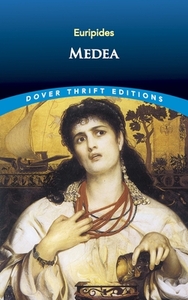You need to sign in or sign up before continuing.
Take a photo of a barcode or cover
myloop's Reviews (60)
POV: You complete your boyfriend's impossible divine challenges, save his life by killing your own brother, then bear his children. Your reward? He cheats on you and sends you into exile.
WWMD (What Would Medea Do?)
WWMD (What Would Medea Do?)
When Phaedra is cursed by Aphrodite to be attracted to her celibate stepson, (Hippolytus,) she kills herself. Hippolytus' conversation with his father, (Theseus,) goes as follows:
Theseus: "She killed herself because you raped her!"
Hippolytus: "Why would I do that? I HATE women!"
Theseus: "She killed herself because you raped her!"
Hippolytus: "Why would I do that? I HATE women!"
Jealous of her husband's relationship with his slave, Hermione leads a manhunt against Andromache and her son. With the help of Peleus and Thetis, Andromache must argue for her right to live.
Irony stitches this play together. Andromache's saviors and the father of her son, are both directly related to the man who killed her husband, Hector. She is haunted by Hector's death and her resentment for the Greeks, while being permanently tied to them. It's also impossible not to have some sympathy for Hermione, whose husband is cheating on her with an enemy slave.
In the end, the slave owner, rapist, and cheater, Neoptolemus, is hardly faced with an ounce of blame.
Irony stitches this play together. Andromache's saviors and the father of her son, are both directly related to the man who killed her husband, Hector. She is haunted by Hector's death and her resentment for the Greeks, while being permanently tied to them. It's also impossible not to have some sympathy for Hermione, whose husband is cheating on her with an enemy slave.
In the end, the slave owner, rapist, and cheater, Neoptolemus, is hardly faced with an ounce of blame.
A play that is literally and figuratively haunted by a ghost.
In a quasi-murder mystery, Hecuba, (once queen of Troy, now a slave,) searches for the killer of her son. Once she finds the murderer, she will have her revenge.
In a quasi-murder mystery, Hecuba, (once queen of Troy, now a slave,) searches for the killer of her son. Once she finds the murderer, she will have her revenge.
In a twist on the Trojan war, Paris unknowingly takes a "puppet" version of Helen, while the real Helen is whisked off to Egypt in hiding. Now, after the war, Helen comes across a shipwrecked stranger dressed in sailcloth, who looks an awful lot like her long lost husband, Menelaus.
In other retellings of this myth, it was always the question- is Helen responsible for this war? Euripides' 'Helen' explores one of the most spineless answers to that question. An answer that fills in the plot holes and absolves characters of their flaws, at the expense of the very stuff that makes the Trojan War a compelling story.
In other retellings of this myth, it was always the question- is Helen responsible for this war? Euripides' 'Helen' explores one of the most spineless answers to that question. An answer that fills in the plot holes and absolves characters of their flaws, at the expense of the very stuff that makes the Trojan War a compelling story.
I read two translations of The Frogs, and this is my preferred one!
Despite their popularity, few people outside of fans actually know anything about BTS.
Little does the public know how BTS have waded neck deep in socio-political affairs for nearly their entire career. Or how they initiated a music industry reform in the working conditions of the Kpop industry. They don't know BTS' extensive knowledge of music, art, history, and nuanced social justice that fuels their creativity in countless genres of music. They don't know the sacrifices that these seven men made to break into the global music scene, and why that is *so* mind-bogglingly significant for the timeline of music history.
And maybe this book will finally answer the question that baffles most major news sources: "Why the hell haven't BTS disbanded yet?"
To a true, fan, nothing in the book will surprise you, but that's just a testament to how transparent the members have been with ARMYs over the past decade.
Little does the public know how BTS have waded neck deep in socio-political affairs for nearly their entire career. Or how they initiated a music industry reform in the working conditions of the Kpop industry. They don't know BTS' extensive knowledge of music, art, history, and nuanced social justice that fuels their creativity in countless genres of music. They don't know the sacrifices that these seven men made to break into the global music scene, and why that is *so* mind-bogglingly significant for the timeline of music history.
And maybe this book will finally answer the question that baffles most major news sources: "Why the hell haven't BTS disbanded yet?"
To a true, fan, nothing in the book will surprise you, but that's just a testament to how transparent the members have been with ARMYs over the past decade.








